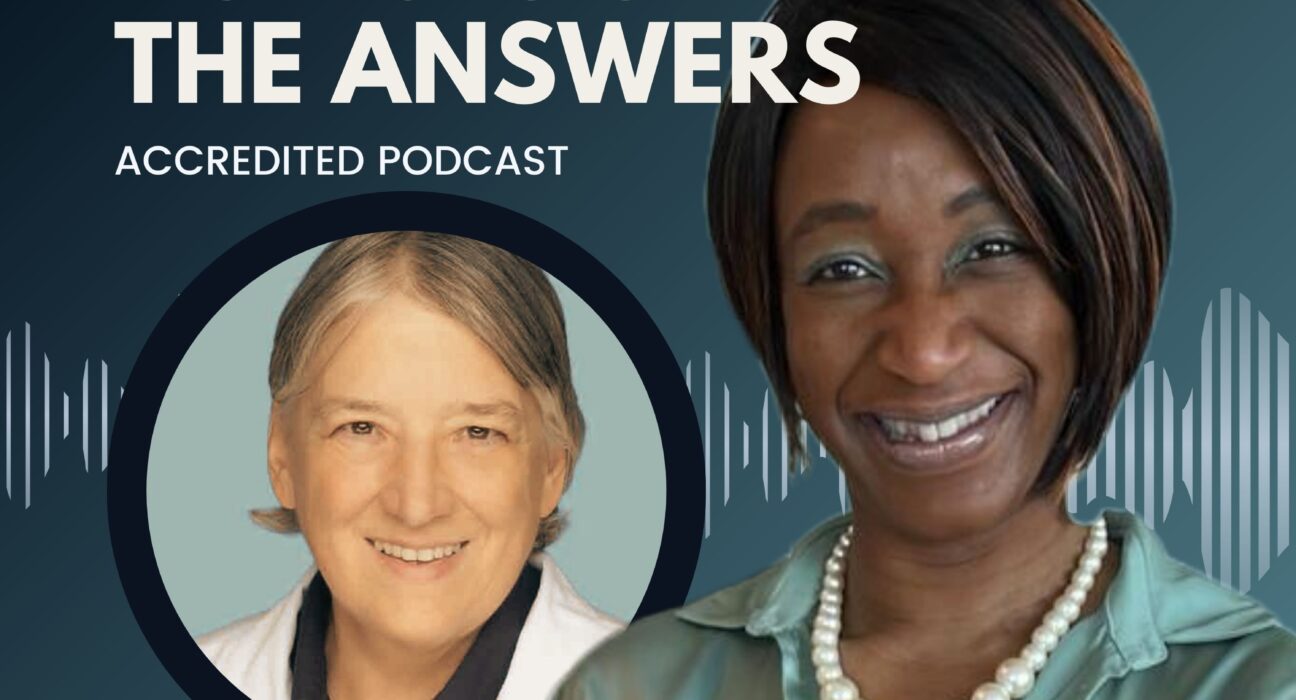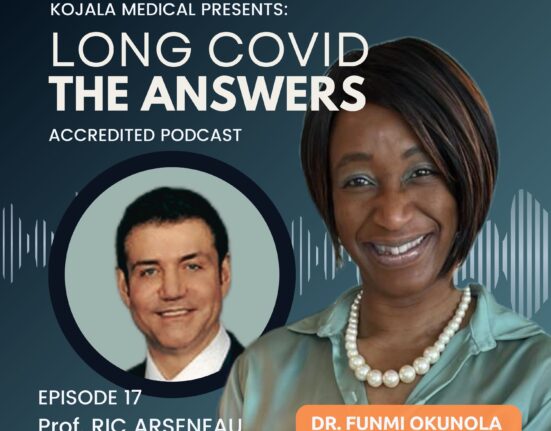
Explore groundbreaking insights into Long COVID, starting with the transformative potential of monoclonal antibody treatments for viral persistence. Professor Nancy Klimas discusses emerging research showing spike protein antigens lingering in tissues, triggering systemic inflammation and immune dysregulation. The persistence of viral elements in organs, not just blood, raises critical questions about the disease’s pathology. Prof. Klimas emphasizes monoclonal antibodies’ ability to reduce antigen burden, aiding immune recovery. The episode highlights recent studies, the importance of biorepositories, and the role of targeted interventions, offering hope and tools for Long COVID patients to navigate recovery and improve their quality of life.
Guest – Professor Nancy Klimas
Note: The podcast has no bias. All conflicts of interest are highlighted with individual guests.
Healthcare Professionals | Earn 0.5 Certified Mainpro+® Credits! Please register/login to claim your CPD/ CEU credits.
Podcast Overview:
What is the role of monoclonal antibody infusions in treating Long COVID?
- Monoclonal antibodies show promise in reducing persistent spike protein antigens.
- These antigens, linked to inflammation and organ dysfunction, may drive Long COVID symptoms.
- Early case studies report significant recovery in patients treated with monoclonal antibodies.
Why does viral persistence matter in Long COVID?
- New research finds 42% of Long COVID patients retain spike protein antigens.
- Spike protein presence is higher in tissues and organs than in blood, suggesting compartmentalization.
- Persistent antigens can trigger inflammation, immune dysfunction, and thrombotic complications.
How does spike protein affect the body?
- Spike proteins interact with ACE receptors in various organ systems, causing widespread damage.
- This leads to systemic inflammatory responses and potential epigenetic changes.
- Persistent spike proteins could explain chronic symptoms in recovered COVID patients.
What are the hypotheses behind Long COVID pathology?
- Two main theories:
- Persistent whole virus replicating in organ compartments.
- Residual mRNA driving continued spike protein production.
- Both mechanisms could disrupt immune recovery and prolong disease effects.
What is the significance of studying monoclonal antibodies?
- Monoclonal antibodies may clear persistent spike protein antigens, alleviating symptoms.
- Lowering the antigen burden could allow the immune system to recover and self-regulate.
What future research is underway?
- Dr. Klimas’ study, supported by FDA approval, will explore monoclonal antibody efficacy.
- Comprehensive biorepositories will track antigen levels and immune responses.
- The goal is to identify actionable interventions for Long COVID recovery.
Resources for patients
- Dr. Klimas highlights the Hope and Help podcast series, offering practical advice and insights.
- The series provides tools for managing complex chronic diseases like Long COVID.
DISCLAIMER: The information in this podcast is provided for informational purposes only. You should not use any information discussed in this podcast and related materials to make medical or healthcare related decisions. Always consult a your physician or other qualified health care provider with regards to diagnosing managing your medical condition. Any medications or treatments, including any discussed in this podcast, should be initiated and managed by a qualified health care professional.
Podcast Transcript:
Healthcare Professionals: Please note to claim Certified CPD / CEU credits toward your medical license (Canada & reciprocal CPD/CEU Worldwide), you will need to register or log in.
Episode 23 – Are Monoclonal Antibodies a Possible Treatment for Long COVID? ft Prof Nancy Kilmas
[00:00:00] Funmi Okunola: The information in this podcast is provided for informational purposes only. You should not use any information discussed in this podcast and related materials to make medical or healthcare related decisions. Always consult your physician or other qualified healthcare providers with regards to diagnosing and managing your medical condition. Any medications or treatments, including any discussed in this podcast, should be initiated and managed by a qualified healthcare professional.
Funmi Okunola: Welcome to Long COVID – The Answers. I’d like to introduce Professor Nancy Klimas. Dr. Nancy Klimas has forty years of professional experience and has achieved international recognition for her research and clinical efforts in complex chronic disease. Notably, Myalgic Encephalomyelitis Stroke Chronic Fatigue Syndrome, Gulf War Illness, Fibromyalgia, and most recently Long COVID.
Professor Klimas is a [00:01:00] past president of the International Association for ME/CFS and a past member of the Health and Human Services CFS Advisory Committee, the VA Gulf War Illness Research Advisory Committee, the National Academy of Medicine’s ME/CFS Clinical Case Definition Working Group and has served on several NIH advisory panels.
She is Professor Emerita at the University of Miami’s Miller School of Medicine, and she is the Director of the Institute for Neuroimmune Medicine, Assistant Dean of Research and Professor of Clinical Immunology at the Dr. Kiran C. Patel College of Osteopathic Medicine in Florida in the U.S.A. She chairs the Department of Clinical Immunology at Nova Southeastern University.
Professor Klimas has founded the NSU Institute for Neuroimmune Medicine, where she directs a group of eighteen inter-disciplinary scientists and clinicians who are working to discover and implement innovative strategies that effectively treat or prevent complex chronic disease. [00:02:00] Welcome, Nancy.
Nancy Klimas: Thank you. I need to breath for a moment after that!
Funmi Okunola: Well, it’s just an amazing career. I think people need to know about it. So, Nancy, do you have any conflicts of interest to declare?
Nancy Klimas: I do not.
Funmi Okunola: Thank you. Excellent.
So today I’d like to explore some of the features of your recent research paper entitled “Remission of Severe Forms of Long COVID following Monoclonal Antibody Infusion, a Report of Signal Index Cases and Call for Targeted Research”, published in the American Journal of Medicine, Emergency Medicine in January 2024. Now this was a really exciting series of case studies of three individuals with Long COVID who developed complete remission of their Long COVID symptoms, following an infusion of a monoclonal antibody called “Regeneron”, which is a Or, my pronunciation is never good at this, ‘Casirivimab stroke Imdevimab antibody cocktail’.
All three patients had severe fatigue and brain fog [00:03:00] in common, but also had a host of other Long COVID symptoms. Nancy, could you please tell us first what a monoclonal antibody treatment or infusion is?
Nancy Klimas: Absolutely. So, mono means one, just one antibody. Your body makes hundreds of thousands of antibodies every single day, and when you have an infection, it will mount an immune response to all the different parts bits and pieces of a virus, or in the body, bacteria or whatever you’re infected with. I like to use HIV as an example because we did so much work on that back in the day, but you might have thirty-two different antibodies that would be made to that one virus.
Funmi Okunola: Right?
Nancy Klimas: So, with COVID there’s the obvious antibody you’d like to have is to spike protein because the virus has that – it binds to the cell with that particular spot and trying to interfere with that and better yet grab that virus and get rid of it is the goal. One of the antibodies in that monoclonal mix was a spike [00:04:00] protein antibody. That’s what monoclonal antibodies are.
It’s not the same as your own body’s immune response, like I say, because it’s just one antibody. But on the other hand, it’s a whole lot of money in the body, a lot more than your body might have made. It’s not exactly what you’re doing with your own immune response it’s a much bigger bang for the buck there.
Funmi Okunola: Okay. So how was this treatment used pre-pandemic and then during the pandemic?
Nancy Klimas: It’s important to understand that this virus changed a lot and continues to change a lot. These are called variants, right? And at the beginning of the pandemic, we had alpha, then beta and then delta. You might remember this as ABCD. We’re on Omicron now, but and even amongst that, there’s been dozens of variants of that particular variant.
Your immune response is changed as the virus has changed, and so this is how Regeneron was created during [00:05:00] alpha, beta, delta, and it was approved during that time. It was being used to treat acute infection, and there was a similar one called Evusheld at the time that was being used for chronic infection. Because it lasted six months, they fixed it so that it would persist. That was an AstraZeneca product. So, in this particular case study series, Regeneron was used in this particular physician’s practice. Again, not mine. I got called in. The academic called in later to try to see if this amazing observation could move forward.
What happened in these three cases was that the patients came in with Long COVID – with a lot of neurocognitive symptoms, and the doctor gave them Regeneron the first time because they got another case of COVID, and they were treating the COVID, and when they got over the Acute COVID, their Long COVID was gone.
So, that was the first time, and encouraged this clinician, Dr. Scheppke, to keep using this product in his clinical practice. [00:06:00] Then the first three clean cases that he got, he told his good buddy who tracked me down and told me about it, and another doctor and Dr. Marty, and she wrote up the case series, and they bugged me to try to create a clinical trial around it.
We hustled to do that, and we had a problem because alpha, beta, delta, that phase of the illness was pretty much over by early 2023. So, Regeneron would have been effective, one would imagine, for cases that started back then and not afterwards perhaps, and so we rushed to try to start a Regeneron trial.
By the time I got it to the point where I could have submitted it to the FDA, the Regeneron was expiring, and we couldn’t use an expired product, you know, illegal and bad for you – don’t know what’s in there.
We went to the company, and they were not interested in creating more product or changing the product or working with us. They [00:07:00] basically gave us a hard “no”. So, then we went fishing for a new partner, and AstraZeneca, who made that Evusheld product I mentioned before, the long-lasting product, had created a new long-lasting product – later versions of the virus.
They were willing to talk to us, and they had product. It was a bit of a process, but I actually wrote the protocol and submitted it to the FDA just about thirty days ago. The FDA has been amazing. They did a rapid review, and I just got the last little bit of information they needed in to them today at noon. I had to do it by noon today, but that means we should have our FDA approval in the next thirty days.
So, I get it to the IRB, and I intend to start the study in January of 2025
Funmi Okunola: Oh, that’s amazing.
Nancy Klimas: Very exciting. Yeah. That’s really, yeah, it is hot off the press because I wasn’t allowed to talk about it until the FDA said it’s okay, but I’m assuming that this latest letter means [00:08:00] I’m good to go.
Funmi Okunola: That’s just fantastic.
Nancy Klimas: I’m so pleased. Very good news. Yeah, he did a lot more cases after those first three. I think he told me that he did twenty-one or so and that nineteen responded. So that was a very encouraging thing again with Regeneron, not with this AstraZeneca product, but they’re very similar in terms of the target.
Actually, I’m kind of optimistic with AstraZeneca because this product persists for six months, so it gives the chance for the antibody to really clear it out, and then keep on clearing it out until it’s good and gone. So, knock on wood that this spike protein focused antibody is sufficient to clean it all up and help clear it out. We’ll see. We will find out.
Funmi Okunola: That’s so exciting and thank you for sharing that with us. I can’t believe Regeneron didn’t want to work with you! There’s a possibility that there’s four hundred million people with Long COVID in the world.
Nancy Klimas: I was disappointed. They were encouraging me for a little while, but then [00:09:00] they sent me a hard “no letter”.
Honestly, at that point there were three products at the time – all of them were expiring in a matter of a few months or were just expired in spring of this year of 2024. All the products were either that the shelf life was over, or they would be over by August, and I thought by the time we get this to the FDA, and why get your hopes up, and then have a Company that’s not willing to keep on going. So instead, I went to AstraZeneca with some great help from some really good people to introduce me to the right people, and the AstraZeneca people have been amazing. They’ve been really good.
The other thing is that it’s an unusual study because first it’s funded by the State of Florida, which is very odd. They’re not usually in the clinical trials business; partnered with the Schmidt Family, Initiative for Long COVID, which is an amazing foundation that’s doing really cutting edge and innovative work. So, they basically were matching each other. It’s a matched award to allow me to do this study. It moved from being [00:10:00] a little twenty patient study that would just you know show promise to being a proper placebo-controlled trial with one hundred people.
Funmi Okunola: That’s fabulous. That is absolutely fabulous. Thank you so much for doing that.
Nancy Klimas: We’re very excited. It’s our top priority. It’s very hard to get things like this done quickly, but the FDA – thirty days, they were just great! I mean, honestly, the FDA did their job and did it really well. My team has got a lot of things that we do.
We are the clinical trials consortia for Gulf War Illness for the country. We home base all of the Gulf War Illness-related trials that the DOD are funding. So, we already had the infrastructure to roll out another kind of study. We were in the right place with the right people to pull this off.
Of course, we’re very passionate about it. That helps a lot. I’m able to brag about my amazing team who have done some tremendous work. Dr. Chima and lots and lots of great people in our group [00:11:00] who have put everything else aside or at least put it down long enough to get this thing done. This is a lot of work to in a very short window.
Funmi Okunola: Yeah, it’s just going to provide such hope to so many, long haulers, and it’s just absolutely amazing. Thank you so much for sharing that with us.
With reference to Appendix A of this paper, Nancy, could you please define what you think are the various categories of Long COVID or the Post Acute Sequelae of SARS-CoV-2 infection, and why this is relevant?
Nancy Klimas: This is really Dr. Scheppke’s baby. I want to give him a lot of credit because he’s got a great big job. He’s the second in command for all of the Public Health Service of Florida, and yet he still has a private practice, and he did all of this important work. So, I’m going to give him the credit that he deserves.
Funmi Okunola: Rightfully so. Great stuff!
Nancy Klimas: The first is a group of people that during Acute COVID had damage to organ systems that were from [00:12:00] the acute infection, permanent structural changes from the acute infection, and have persistent inflammation, and persistent thrombosis types of changes.
Then a second group that had the effect on their peripheral nerves, particularly smell and taste. Those people often have just this one complication, but then there’s the group that we see as Long COVID, which is the focus of this report. It looks more like what I tend to see is ME/CFS, myalgia encephalomyelitis, with the Post Exertional Malaise, and the more systemic symptoms that are seen day by day in our Long COVID patients.
Funmi Okunola: With reference to Appendix B, can you explain why you think the monoclonal antibody infusion had this miraculous effect? What do you think is the pathophysiology, i.e. the scientific function changes occurring in the body that could result in this remarkable outcome?
Nancy Klimas: So really that without going back to the appendixes but more [00:13:00] what I’ve learned in the year since, because there’s been some really important work about COVID persistence in the past year. Remember we wrote this paper like a year and a half ago. One is this very important work by
Dr. Where at Harvard whose got one of the best assays for viral persistence, or at least antigen persistence. In fact, he’s going to be doing the assays for our Long COVID study – for the monoclonal study, which I’m grateful to him and to the people in his laboratory as they developed this assay that’s able to pick up very small signals and help us understand.
They published a paper about a month ago that said 42% of people with Long COVID still have persistent spike protein antigen that they can measure. That’s the first time it was that high. There was a paper earlier about 25% and then some very small papers that were picking up between say 20 and 40% but with really tiny numbers of people in them.
That was a really important paper. There’s a paper by a Chinese group [00:14:00] that if people came to surgery for some completely different reason, they did biopsies of various tissues, and they found a very high level of persistent spike protein as the measure of something going on related to COVID in the tissues, in the organs far higher than what they were seeing in the blood.
So, it’s possible the bloodstream is not even the best place to be looking for whether or not there’s virus persisting, and it seems to be more in the organ systems. Then the paper that we talked about by Dr. Wüst in Amsterdam, he did muscle biopsies, and he looked for nuclear capsid antigen which is different. That’s not the spike protein. It’s another part of the outside of the virus, but it’s a different part. And he found it universally in his controls as well as in his sick patients. His conclusion was that he couldn’t blame COVID persistence for what he was seeing in those muscle biopsies because he saw it in the controls as well as the sick people, [00:15:00] but that everybody had it.
That is disturbing because there’s another presentation just a few weeks ago by Dr. Fraser in Canada, who’s also funded by the Schmidt Family Foundation, and they showed in a metabolomic study that they could tell sick people on COVID from recovered people, Acute COVID, but they could tell people who never had COVID from recovered people.
What would suggest that you’ve ever had COVID, you still have a signature, an epigenetic phenomenon, something happened that stayed with you even after you recovered, that you can pick up in a metabolomic study. So, wow, that’s spooky. Okay. I mean, that’s saying since most of us have had COVID at this point, what’s the percentage? I don’t know, but it was high 80s. Last time I looked most people have seen COVID, and we still have lots and lots of COVID in our [00:16:00] communities. We have a great outbreak going on right now, that there’s permanent changes having ever had COVID, and so then when you say, “Well, what about this monoclonal antibody of yours, Nancy”? My answer is, “We’re going to see because spike protein to me is the most damaging part of the virus”.
So, it’s possible that people with Long COVID have persistent virus. That would mean they’re still replicating virus and making virus and it’s still attacking stuff. A little hard to say that’s for sure what’s really going on if we’re not seeing it in the bloodstream that much, but we’re seeing it elsewhere.
It’s a little bit, I mean, not impossible to postulate that, but you’re thinking it’s in some compartment somewhere, not necessarily in the bloodstream if you’re seeing it universally in tissues, but not universally in blood. You have something called compartmentalization. Where does it go?
It’s like an HIV when we completely clear HIV because the blood brain barrier is so good at [00:17:00] keeping the antivirals out. You could still have a reservoir of HIV in the brain that never got to see the antiviral. That would be a compartmentalization that’s in the brain, nowhere else. That’s HIV, not COVID.
So, we’re sitting here looking at COVID going, where’s this damn virus hanging out and how do I get there? That’s one thing. Then the question is, will a monoclonal antibody against spike protein clean it up? Well, it’s very exciting that Dr. Shepke’s patients got so well, that definitely makes you think maybe so.
Nancy Klimas: There’s another possibility, which is that the message RNA for spike protein is being given to some other cells. Not necessarily the whole virus, but just the message to make this protein so there’s two possibilities. There’s a whole virus replicating, hiding out somewhere, not necessarily the bloodstream, but hiding out, and there’s the other possibility that it’s not a whole virus.
It’s the message that makes the spike protein antigen, and you’re swimming in spike [00:18:00] protein antigen, which really would mess you up because the ACE receptor, which is everywhere in every organ system, but particularly on the endothelium of your blood vessels, it would trigger an inflammatory response that would promote the thrombosis that we see so commonly among COVID.
So it could be that spike proteins like the first start trying to go upstream from all the downstream stuff that makes you sick. That might be the very spot that we should intervene in is trying to get that spike protein out of the system. Or it could be that we have actual whole virus and we’re trying to clear it out.
Funmi Okunola: Yeah, I think your hypothesis coincides with a lot of Amy Proal of Polybios Work. We interviewed her, and she’s all about viral persistence and how the virus is important in organs.
Nancy Klimas: I’m hoping that monoclonal will do it. Let me say that Dr. Scheppke had this amazing response to monoclonal. So, you’ve got to say if you’ve got a case series of nineteen, let’s go try that out. But sometimes as we learned in HIV, just getting the viral burden down for a [00:19:00] while gives the immune system a chance to recover, and do its darn job, right? So it could be that it’s a one-two thing instead of that you’re just the one thing. But we’ll find out, right? And then we’re going to measure everything. I’m making a biorepository. Poor patients that volunteer for this study are giving me a little bit of almost everything they’ve got so that we can better understand what’s really going on.
Funmi Okunola: Well, Nancy, that is just so fantastic. Thank you for an exciting and stimulating set of interviews and thank you for sharing this hot off the press news with us about the amazing study you’re going to do into monoclonal antibodies. I’m so glad that you’ve had that FDA support. Thanks to you and all those in your team for providing hope to individuals around the world suffering with complex chronic disease.
Nancy Klimas: And if you would put it in your links too, we have our own podcast series. We have some amazing, information – it also has the word “hope” in it – “hope and help”. [00:20:00] It’s very much focused on giving people the pearls of information that’s clinically relevant to you, the patient, that makes you feel more hopeful and perhaps give you some tools to help with your own struggle to get back to health.
Funmi Okunola: Yes, I will do that. I’ve been listening to some of them, and yes, we’ll put it in the show notes, and we’ll probably feature it on our website too as one of the useful podcast information series. Thank you again, and I’m saying to the audience, please join us next week for another Episode of Long Covid -The Answers.
Funmi Okunola: Some questions for listeners to consider.
What are your top five takeaways from this Episode?
How will this Episode change your practice or perception of this disease?
What will you do to act on what you’ve learned?
Please discuss your thoughts on our social media outlets such as Twitter or X, our website blog, Instagram, Facebook, LinkedIn.
Please rate this Episode.
SHOW NOTES:
Dr Funmi Okunola MD interviews Professor Nancy Klimas MD about her research into the use of Monoclonal Antibodies as a possible treatment for Long COVID. We have an exciting and exclusive breaking news item in this episode!
REFERENCES








